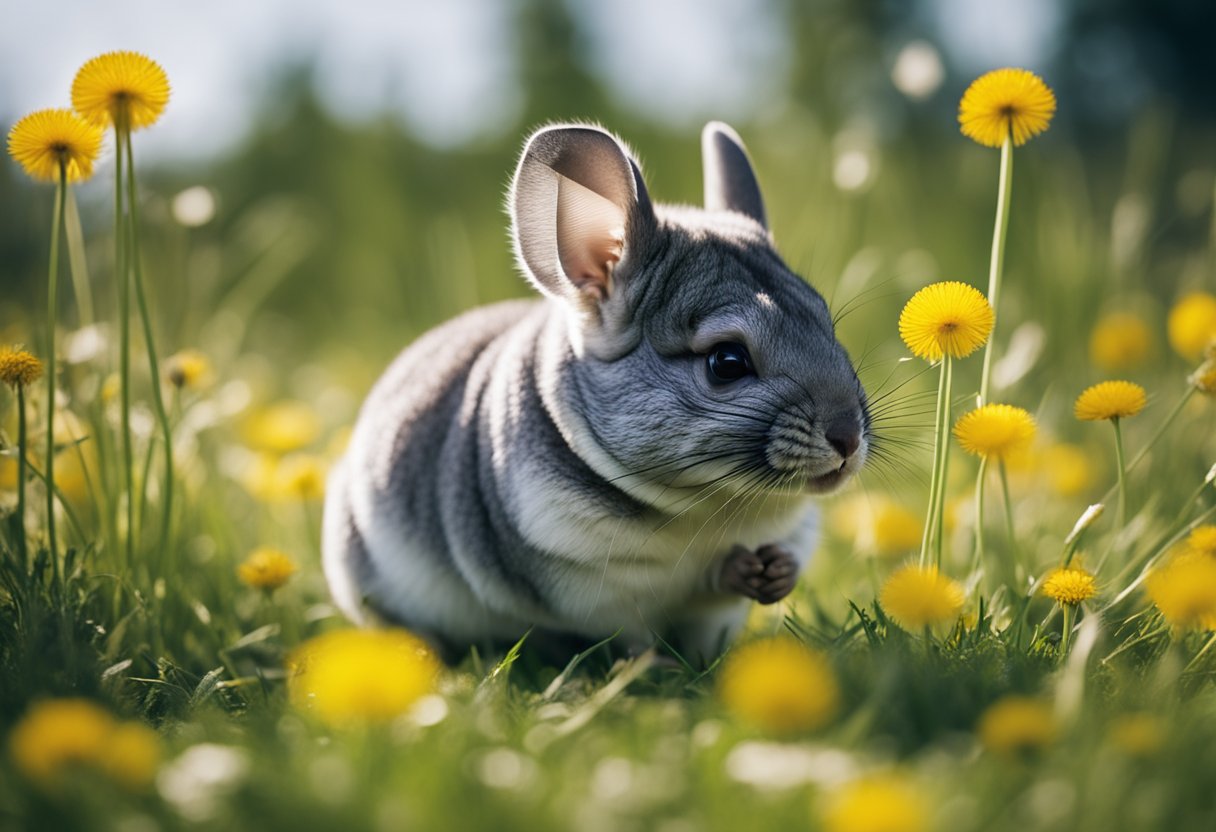Can Chinchillas Eat Dandelions? Understanding Their Safety and Nutritional Value
Dandelions are a common sight in gardens and fields, and you might wonder if they are safe for your chinchilla. Chinchillas can eat dandelion leaves, but it’s important to avoid feeding them the flowers. These plants offer several health benefits, making them a great occasional treat for your furry friend.

Many pet owners are curious about incorporating new foods into their chinchilla’s diet. Dandelion leaves are rich in vitamins and minerals that can help keep your chinchilla healthy. However, moderation is key, as too much can lead to digestive issues.
Learning how to safely include dandelions in your chinchilla’s diet is essential for their well-being. Ensuring they are pesticide-free and served in the right amount will benefit your pet while adding variety to their meals.
Key Takeaways
- Dandelion leaves provide essential nutrients for chinchillas.
- Only feed dandelion leaves, avoiding the flowers.
- Moderation is crucial to prevent digestive problems.
Nutritional Benefits of Dandelions for Chinchillas

Dandelions offer several nutritional benefits for chinchillas. These include essential vitamins and minerals, as well as fiber that supports digestive health. Understanding these aspects helps you make informed decisions about incorporating dandelions into your pet’s diet.
Vitamins and Minerals Content
Dandelions are rich in important vitamins and minerals. They contain high levels of Vitamin A, which is crucial for good vision and a healthy immune system.
Additionally, they provide Vitamin C, known for its antioxidant properties. This vitamin supports overall health by helping to reduce inflammation.
Other key minerals found in dandelions include potassium and calcium. Potassium assists in maintaining fluid balance, while calcium supports strong bones and teeth.
When feeding dandelions to your chinchilla, ensure you remove the flowers, as they are not as beneficial. Focus on providing the leaves to maximize these nutritional benefits.
Fiber and Digestive Health
Fiber is essential for a chinchilla’s digestive health, and dandelions are a great source. The high fiber content aids in regulating digestion and helps prevent issues like bloating and constipation.
Including dandelion greens in your pet’s diet can promote a healthy gut, which is vital for nutrient absorption.
Just remember, moderation is key. Too many dandelions can lead to diarrhea due to their diuretic properties. It’s important to monitor your chinchilla’s reaction when introducing new foods. Feeding a small amount can ensure a balanced diet without causing digestive distress.
Feeding Dandelions to Chinchillas

Dandelions can offer some benefits to your chinchilla’s diet, but it’s important to know how to feed them correctly. This includes understanding proper portion sizes, how often to offer them, and any potential risks involved.
Proper Portion Sizes
When feeding dandelions to your chinchilla, portion size matters. A small amount is best to prevent digestive issues. Aim for 1-2 leaves or a small stem per feeding.
Avoid giving them the dandelion flowers, as these are not suitable for chinchillas. To keep it fresh, make sure that the dandelions are free from pesticides or chemicals. This is crucial for your pet’s health.
Using fresh dandelions can be more beneficial than dried ones. Fresh leaves have higher moisture content, which can help keep your chinchilla hydrated.
Frequency and Moderation
Dandelions should not be a daily treat. Instead, consider offering them a few times a week. This way, your chinchilla can enjoy the benefits without risking any health problems.
Introduce dandelions gradually, especially if your pet is not used to them. Start with small amounts and observe how your chinchilla reacts. If your chinchilla shows signs of digestive upset, reduce the frequency or quantity.
Mix dandelions with other safe plants or hay to create a balanced diet. This variety will provide necessary nutrients and prevent boredom.
Potential Risks and Concerns
While dandelions are generally safe for chinchillas, there are some risks. High oxalate levels in dandelions can be harmful if consumed in large amounts. Excessive intake may lead to digestive problems or diarrhea.
Be cautious if your chinchilla has a history of digestive issues. Consulting with a veterinarian before introducing new foods is always a good idea.
Monitor your pet after introducing dandelions. If you notice any changes in behavior or health, contact a vet immediately.
Resources
For more detailed information about feeding dandelions and other safe plants, refer to credible resources. Websites like Planet Chinchilla provide specific guidance on what chinchillas can eat.
Another helpful resource is Cheerful Chinchilla, which gives tips on suitable treats and feeding practices. You can also check PetsHun for nutritional information about dandelions.
Frequently Asked Questions

Chinchilla care involves understanding which foods are safe and beneficial. Here are answers to common questions regarding vegetables, fruits, and flowers suitable for your chinchilla’s diet.
What types of vegetables are safe for chinchillas to consume?
Chinchillas can eat a few safe vegetables, such as bell peppers, kale, and carrots. Always introduce new vegetables slowly and watch for any digestive issues. Avoid starchy or high-sugar vegetables.
How often can chinchillas eat fresh greens?
Fresh greens can be given to your chinchilla a few times a week. Make sure to limit portion sizes to prevent digestive problems. Monitor your chinchilla’s response to new greens.
Are there any seeds that chinchillas should avoid?
Yes, chinchillas should avoid seeds that are high in fat, like sunflower seeds. These can lead to obesity and health issues. Stick to hay and pellets as the main diet.
Can chinchillas be fed fruits, and what are the limitations?
Fruits should only be given as occasional treats. Options like apple slices and blueberries can be offered in small amounts. Too much fruit can cause diarrhea due to its high sugar content.
Which flowers are non-toxic and suitable for chinchillas?
Safe flowers for chinchillas include hibiscus and rose petals. Always ensure the flowers are free of pesticides and chemicals. Introduce them in small quantities to check for any reactions.
What are common dietary restrictions for chinchillas?
Chinchillas have specific dietary needs. They should not consume highly sugary or fatty foods, including many human snacks. Stick with hay, pellets, and occasional treats to ensure a healthy diet.

